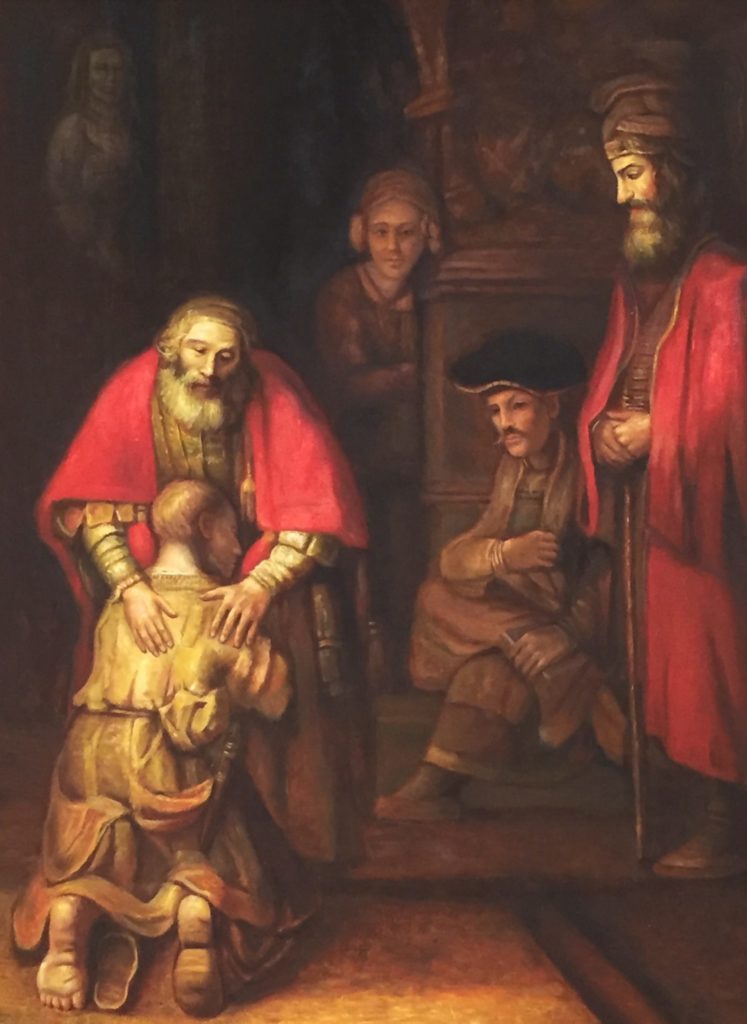Recently I read a book by Henri Nouwen called, “The Return of the Prodigal Son“. The book centers around Nouwen’s experience studying Rembrandt’s painting by the same name. The original story was presented by Jesus and can be found in the 15th chapter of Luke in the Bible. Nouwen highlights the story’s three main characters: the prodigal son, the older sibling and the father. He then relates the actions of these characters to our spiritual lives.
The Prodigal Son
In the story the prodigal son decides that he does not want to wait for his father’s inheritance. He asks his father for his share and then leaves. He rushes out and lives a life of indulgence and pleasure. But, the money eventually runs out and he must work demoralizing tasks to keep from starving.
One day he decides that the humiliation of returning to his father is better than starving to death. He heads home while rehearsing the apology he plans to give his father. His hope is to be accepted as a servant because he believes that what he has done is unforgivable.
Before he can reach the house, he sees the father rushing to greet him. Imagine his surprise when the father hugs and kisses him. The prodigal expresses his desire to be forgiven, “‘Father, I have sinned against heaven and before you. I am no longer worthy to be called your son.’”.
The older sibling
The father has another son who is older than the prodigal. He is a reliable, hard working son. He is proud of his consistent service to his father.
Now he’s angry because the father quickly accepted his returning brother. He doesn’t believe the brother should be forgiven. Shouldn’t he have to perform acts of contrition? He tells his father, ” ‘Look, these many years I have served you, and I never disobeyed your command, yet you never gave me a young goat, that I might celebrate with my friends.”.
If the father is accepting this prodigal son, then he should be treated even better, right? The father reminds this son that he has access to everything that the father has. The father is willing to bless him. All he needs to do is ask.
The father
The father accepts the prodigal son even before the son can speak his rehearsed speech. He sees the son from a distance which means he’s looking for him and wants him to come back. After hugging his son, he turns to his servants and says, “‘‘Bring quickly the best robe, and put it on him, and put a ring on his hand, and shoes on his feet. And bring the fattened calf and kill it, and let us eat and celebrate. For this my son was dead, and is alive again; he was lost, and is found.’”
There is no need to show acts of repentance. He is accepted simply on the basis of who he is. He is one of the beloved children of his father and as such the father is glad that he has returned home.
The application
Nouwen asks, which character are you? Are you the one who has been living a life of self serving indulgence? If you want to turn to God, he is waiting and watching for your return. He’ll greet you immediately. A feast is waiting for you! Turn today, don’t wait!
Are you the older sibling? Do you have no sympathy for those who are living a life away from God? Should they show some action in order to be forgiven? Do you know that you can ask God for whatever you’d like right now? If you are the father’s son, he has his hands open. He is waiting for you to ask and is willing to provide for you from his unlimited resources.
Lastly, are you the loving father? Are you a person who is quick to forgive? When someone asks for forgiveness, are you excited to draw them back into your life and celebrate their return? Do you see others as the beloved of God?
A christian’s goal is to move toward becoming like the father. We’re asked to forgive like we’ve been forgiven and love like we’ve been loved. No one said it was going to be easy.

